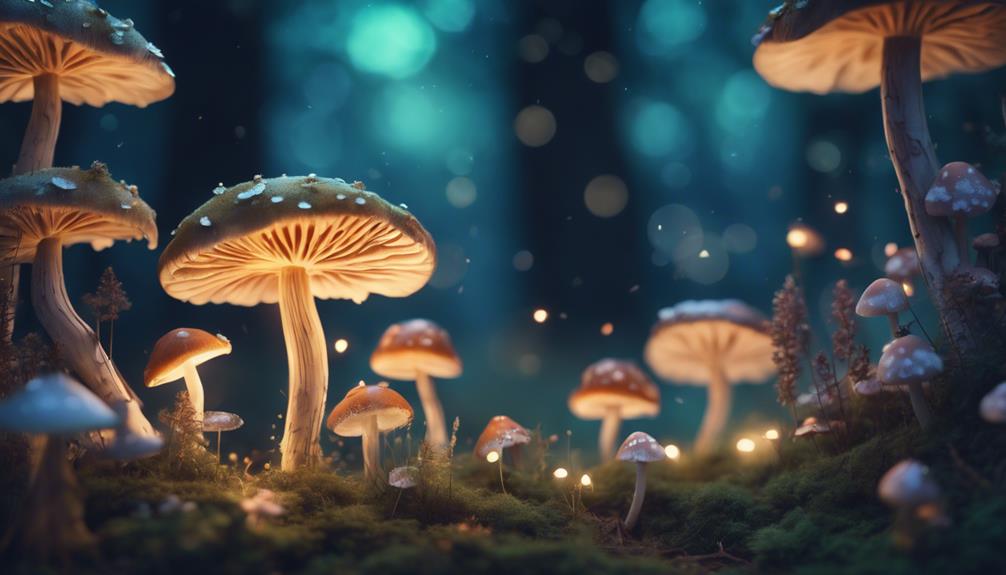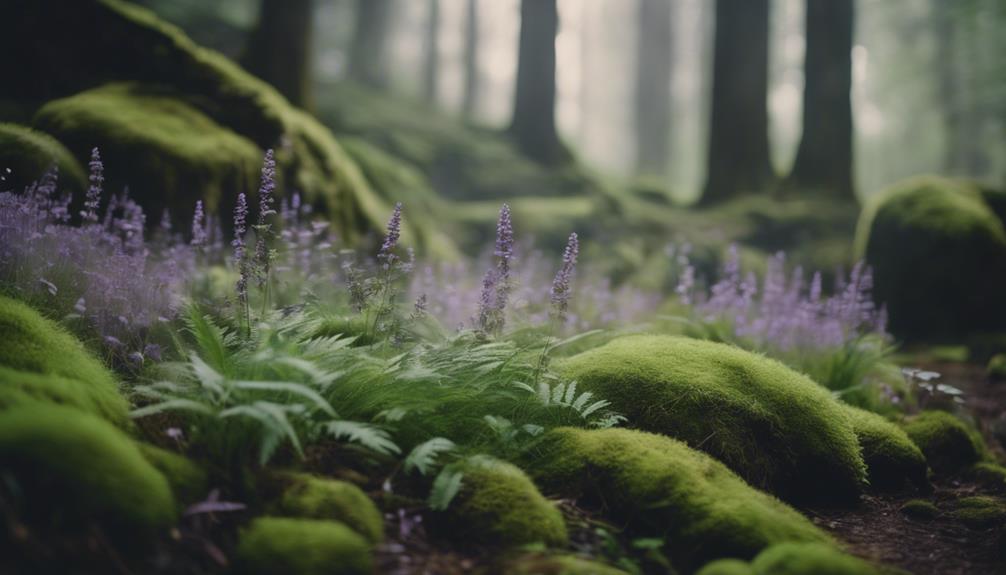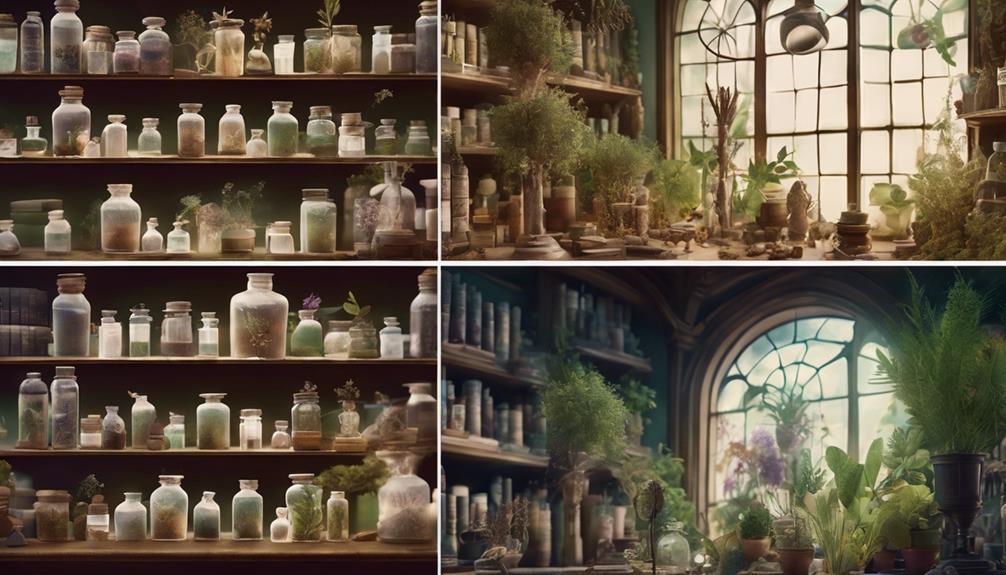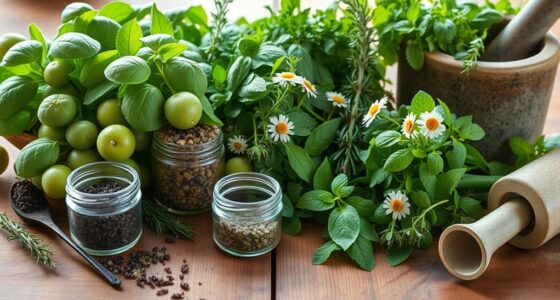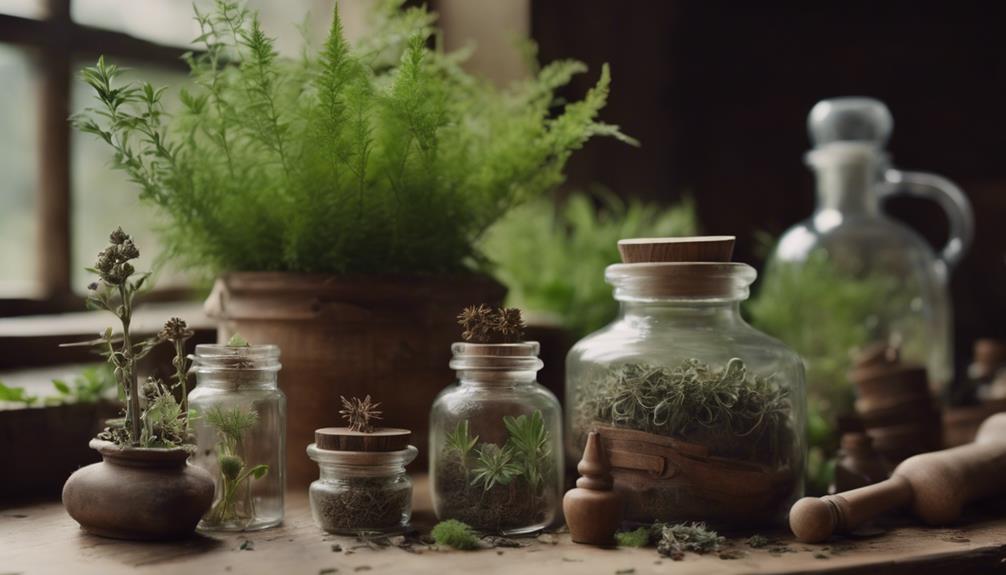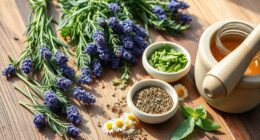As we explore the domain of magical herbalism, we're drawn to the ancient wisdom that lies within the plant kingdom. We discover unique properties and correspondences of herbs, used in spells, rituals, and spiritual practices to tap into their magical potential. From creating herbal preparations like infusions and oils to harnessing elemental connections and plant magic, we reveal the secrets of enchanted botanicals. By aligning our intentions with herb correspondences and harnessing planetary energies, we can achieve spellwork success. As we journey deeper into the world of magical herbalism, we uncover the keys to revealing its full potential.
Key Takeaways
• Magical herbalism combines herbalism with spiritual practices to tap into the unique properties of herbs for desired outcomes.
• Herbs resonate with earth, air, fire, and water elements, and understanding these connections can enhance spellwork and rituals.
• Aligning herbal preparations with celestial rhythms, planetary energies, and zodiac signs can amplify spellwork success.
• Customizing herbal preparations, such as infusions, tinctures, anointing oils, and incense blends, can support well-being and manifest intentions.
• Embracing sustainable harvesting practices, honoring plant spirits, and respecting cultural traditions ensures ethical and responsible magical herbalism.
Unlocking the Power of Herbs
As we explore the world of magical herbalism, we find that the key to discovering the power of herbs lies in understanding their unique properties and correspondences.
In magical herbalism, herbs are used for spells, rituals, and spiritual practices, and each herb has its own distinct characteristics that make it suitable for specific purposes. For instance, lavender is often used for calming and soothing, while sage is used for purification and protection.
To reveal the power of herbs, we need to understand their correspondences, such as elemental, planetary, and zodiacal associations. This knowledge enables us to create effective herbal preparations, like infusions, decoctions, tinctures, oils, and incense blends, that can be used in our magical practices.
By understanding the unique properties and correspondences of herbs, we can tap into their magical potential and harness their energy to achieve our desired outcomes.
As we investigate further into the world of magical herbalism, we'll discover the incredible possibilities that herbs offer for personal growth, healing, and spiritual development.
Understanding Magical Properties

As we delve into the world of magical herbalism, we're about to uncover the significance of understanding magical properties.
We'll examine how elemental connections, the essence of plant magic, and the properties of enchanted herbs come together to amplify our magical practices.
Elemental Connections Revealed
We explore the mystical domain of elemental connections, where the ancient wisdom of magical herbalism reveals the secrets of harnessing nature's potent energies.
Here, we investigate the magical properties of herbs, understanding how they resonate with the four elements: earth, air, fire, and water. Each element corresponds to specific qualities and energies that can enhance the magical properties of herbs.
We discover that earth herbs like patchouli are grounding and stabilizing, while air herbs like lavender promote clarity and communication. Fire herbs such as cinnamon bring passion and energy, and water herbs like chamomile encourage intuition and emotions.
By understanding these elemental connections, we can tap into the unique energies of magical herbs for our rituals and spellwork. This knowledge allows us to access the natural world, amplifying our magical practices and connecting us with the essence of the elements.
As we explore the domain of elemental connections, we unlock the full potential of magical herbs, unlocking a world of possibilities for our magical journey.
Essence of Plant Magic
By exploring the intricate web of correspondences between herbs and the elements, we can uncover the essence of plant magic, where every leaf, petal, and root holds a unique key to manifesting our intentions.
As we investigate the world of magical herbalism, we discover that each herb possesses distinct magical properties, influenced by its elemental associations, planetary correspondences, and vibrational frequencies. These properties make certain magical herbs more suitable for specific spells, charms, and rituals.
For instance, herbs like chamomile and lavender, associated with the calming element of water, are often used in relaxation and calming spells. On the other hand, herbs like ginger and cinnamon, connected to the energizing element of fire, are commonly used in spells for passion and motivation.
By recognizing and respecting these correspondences, we can harness the unique energies of magical herbs to manifest our desires and intentions.
As we explore the essence of plant magic, we'll uncover the secrets of these enchanted botanicals and learn how to wield their powers responsibly and effectively.
Properties of Enchanted Herbs
Exploring the mystical realm of enchanted herbs, we discover that their magical properties are deeply rooted in their intricate connections to the elements, planets, and zodiacal signs. These associations infuse magical herbs with unique energies and vibrations that can be utilized for specific magical purposes.
In order to effectively harness their magical properties, understanding the color, taste, and smell of herbs is crucial. For example, herbs aligned with the element of fire, such as ginger and cinnamon, are commonly employed in spells for passion and energy. Likewise, herbs associated with the planet Venus, like rose and chamomile, are utilized in love and beauty spells.
We can also access the magical properties of herbs by delving into their zodiacal connections. By grasping these correspondences, we can craft charms, sachets, incenses, and bath blends tailored to our specific intentions.
Through our exploration of the properties of enchanted herbs, we'll unveil the secrets of tapping into their magical potential.
Correspondences for Spellwork Success
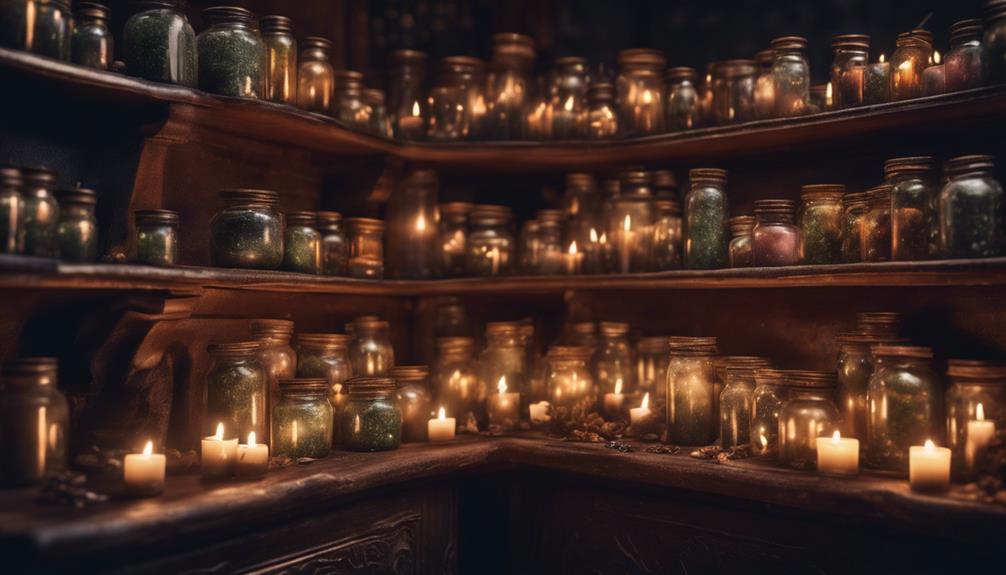
As we explore the domain of correspondences for spellwork success, we'll examine the significance of magical plant allies and effective spell timing.
By understanding how to harness the energies of specific herbs and aligning our spells with the best timing, we can amplify the potency of our magical workings.
Magical Plant Allies
When we craft spells, we tap into the symbolic power of magical plant allies, aligning our intentions with the unique correspondences of each herb to amplify our spellwork success.
Magical herbs, with their distinct energies and properties, become our partners in manifesting our desires. By understanding the correspondences of each herb, we can effectively tap into their powers.
Elemental correspondences, for instance, link herbs to the elements of earth, air, fire, and water, enhancing the effectiveness of our spells.
Planetary correspondences allow us to harness the energies of specific planets, like Mars for courage or Venus for love.
Zodiacal correspondences connect herbs to the zodiac signs, aligning our spellwork with astrological influences.
Lastly, gender correspondences classify herbs as masculine or feminine, carrying distinct qualities that influence spell outcomes.
Effective Spell Timing
We time our spells strategically, synchronizing with the celestial rhythms of the planets and moon phases to amplify the potency of our magical herbalism. By doing so, we tap into the unique energies of each herb, aligning our intentions with the corresponding planetary influences. This harmonization enhances the effectiveness of our spells, making our magical herbalism more potent and successful.
To maximize the impact of our spells, we consider the following astrological correspondences:
- Moon Phases: Aligning our spells with the waxing or waning moon to amplify growth, release, or manifestation.
- Planetary Rulers: Selecting herbs resonating with the energies of specific planets, such as Mars for courage or Venus for love.
- Zodiac Signs: Choosing herbs that correspond to specific zodiac signs, like Aries for bold action or Cancer for nurturing.
- Herb Properties: Understanding the unique properties of each herb, such as calming chamomile or stimulating ginger, to enhance our spellwork.
Preparation Methods for Rituals
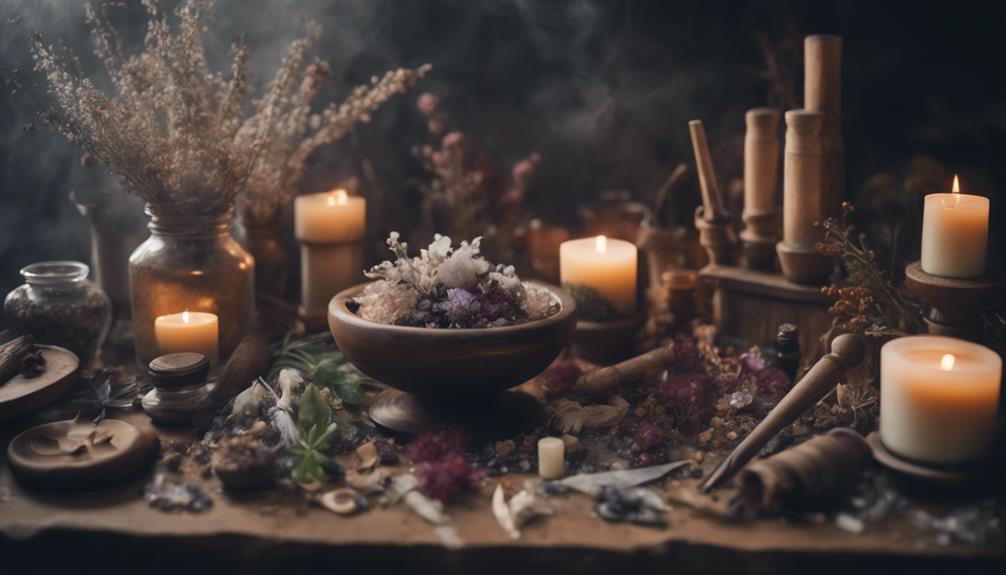
To prepare for our magical rituals, we craft herbal remedies using various methods that reveal the full potential of our chosen botanicals. When it comes to accessing the magic within our herbs, we turn to herbal infusions. By steeping herbs in hot water, we extract their beneficial properties, which are then harnessed for our rituals and spellwork. This gentle process allows us to tap into the subtle energies of our botanicals, making it an ideal method for more delicate herbs. We've found that herbal infusions are particularly effective in enhancing our intuition and connection to nature.
Beyond infusions, we also employ other methods to tap into the magical properties of our herbs. Decoctions, for instance, involve boiling herbs in water to create a more concentrated liquid, perfect for amplifying our intentions. Tinctures, made by soaking herbs in alcohol, preserve the magical properties of our botanicals, allowing us to create potent elixirs.
Additionally, we craft herbal oils and incense blends to harness the energies of our herbs for topical applications and spiritual cleansing. By mastering these preparation methods, we can access the full potential of our herbs and elevate our magical practice.
Infusions for Inner Balance
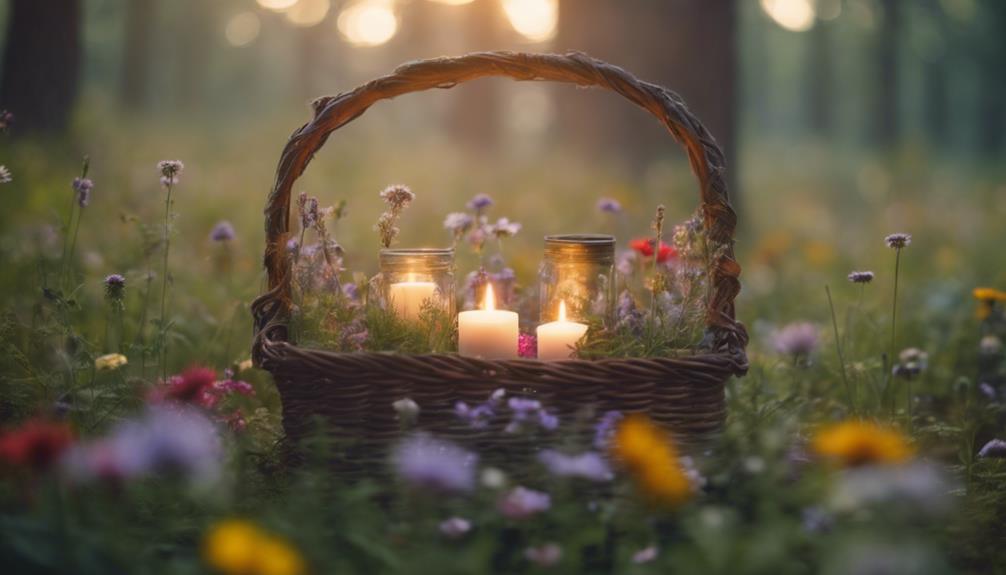
As we explore the world of infusions, we find that these gentle, yet potent, herbal teas offer a natural path to achieving inner balance by supporting our bodily functions. Infusions have magical uses, allowing us to access the power of herbs to promote harmony within our bodies. By steeping plant material in hot water, we can reveal the medicinal properties of various herbs, tailoring our infusions to address specific needs and preferences.
Some of the benefits of infusions include:
- Supporting digestion with herbs like peppermint and ginger
- Boosting immunity with herbs like echinacea and elderberry
- Promoting relaxation and calming effects with herbs like chamomile and lavender
- Providing antioxidant-rich blends to combat oxidative stress
Regular consumption of herbal infusions can be a gentle and natural way to maintain overall well-being and promote harmony within the body.
With the ability to customize our infusions at home, we can take control of our health and well-being, using these magical elixirs to support our journey towards inner balance.
Tinctures for Transformation
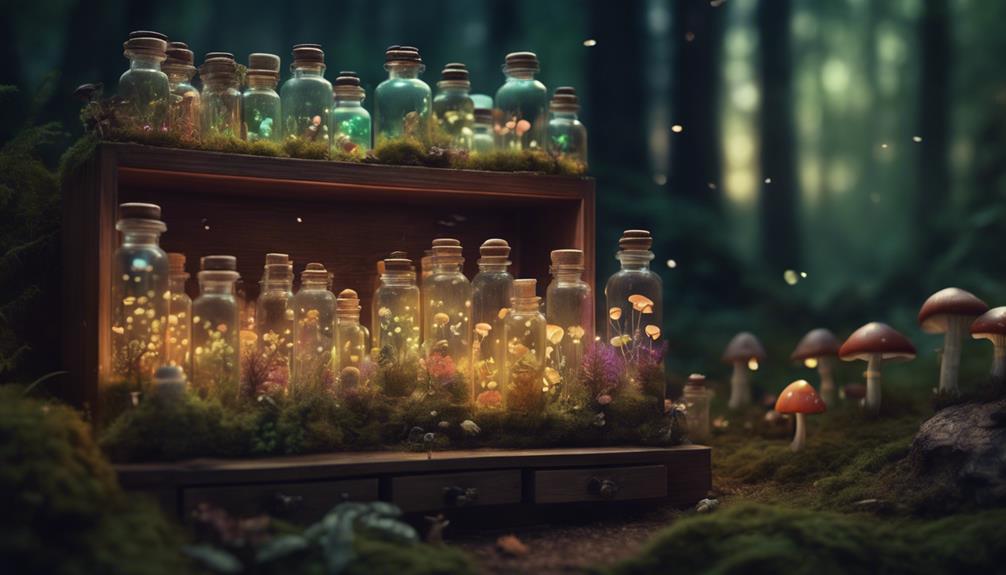
Beyond the soothing domain of infusions, we're now ready to tap into the potent world of tinctures, where concentrated herbal extracts await to amplify our magical pursuits.
As we explore the domain of tinctures, we uncover a world of possibilities for transformation. Unlike infusions, tinctures are made by soaking herbs in alcohol or vinegar, creating a potent extract that can be used for various magical purposes.
We can customize our tinctures at home, selecting herbs that align with our desired magical effects. For instance, a tincture made with chamomile can promote calmness, while one made with ginger can enhance vitality.
As we investigate the world of tinctures, we can refer to our trusty book of magical herbalism, which provides guidance on creating and using these potent extracts. Whether we're seeking to enhance our rituals, promote healing, or simply connect with nature, tinctures offer a powerful tool for transformation.
Magical Oils for Anointing
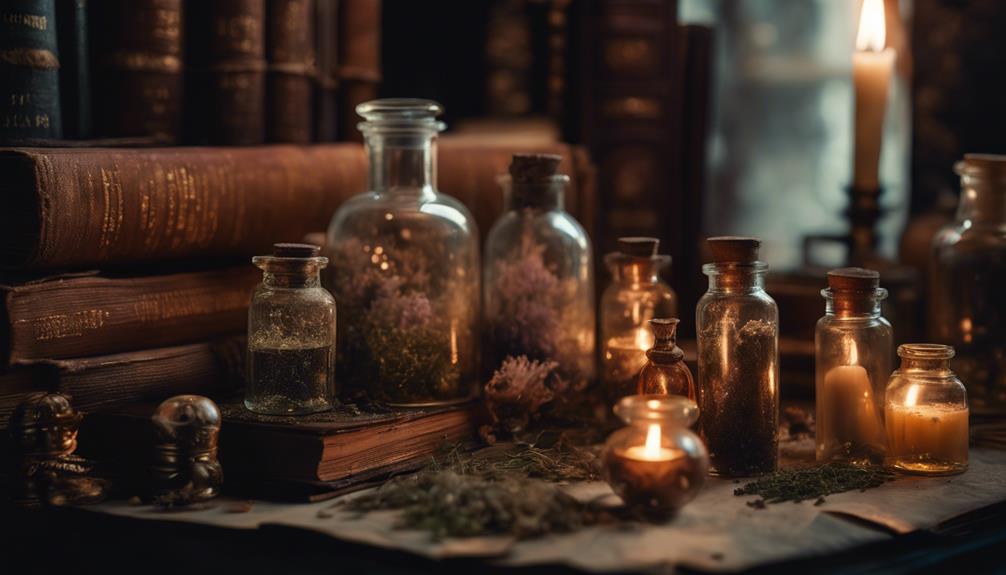
We explore the world of magical oils, which have been revered for their potency in amplifying our magical pursuits and fostering a deeper connection with the divine. These oils are often infused with specific magical herbs, essential oils, and other ingredients to enhance their magical properties.
Anointing with magical oils is believed to create a connection to the divine, set intentions, and amplify magical energy.
When creating magical oils, we charge them with intention, energy, and sometimes under specific astrological influences for added potency.
Different oils are used for various purposes, including:
- Protection: to ward off negative energies and promote a sense of safety
- Love: to attract and nurture romantic relationships
- Prosperity: to manifest abundance and financial success
- Purification: to cleanse and purify our energies and environments
Incense Blends for Atmosphere
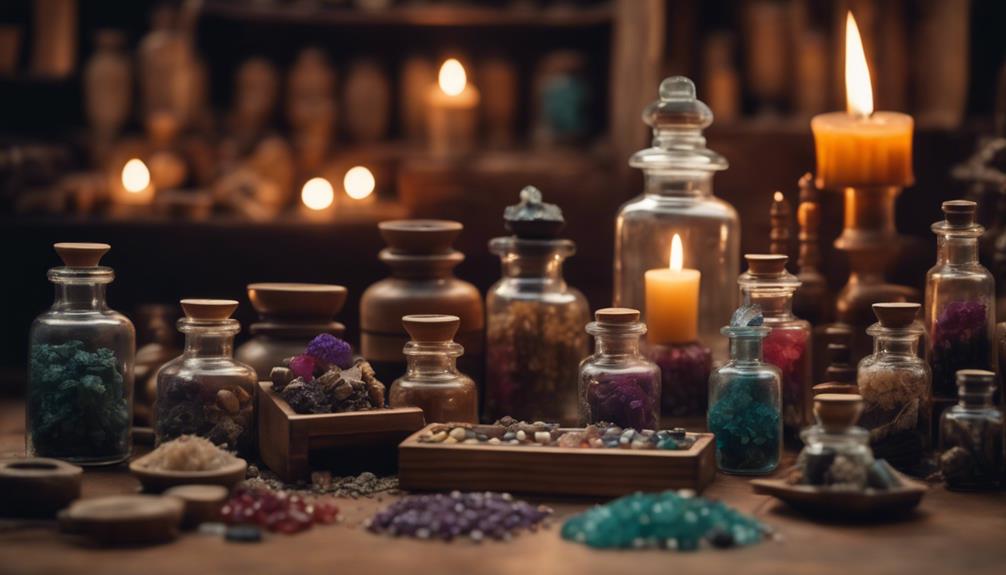
We craft incense blends, carefully combining herbs, resins, and essential oils to conjure the perfect atmosphere for our magical pursuits.
These blends are more than just a pleasant aroma; they're a deliberate combination of magical herbs, each chosen for its unique properties and correspondences.
By selecting specific herbs, resins, and essential oils, we can create blends that resonate with our intentions, whether it's to purify a space, enhance our focus, or set the mood for a ritual.
For instance, lavender is often used for calming and soothing, while sage is known for its purifying properties.
We can customize our blends to suit our personal preferences and magical goals, ensuring that the atmosphere we create is tailored to our specific needs.
By burning these carefully crafted incense blends, we can transform our surroundings, fostering an environment that supports our magical growth and exploration.
As we experiment with different blends, we'll discover the unique properties of each magical herb, revealing the full potential of our incense magic.
Respecting the Plant Kingdom
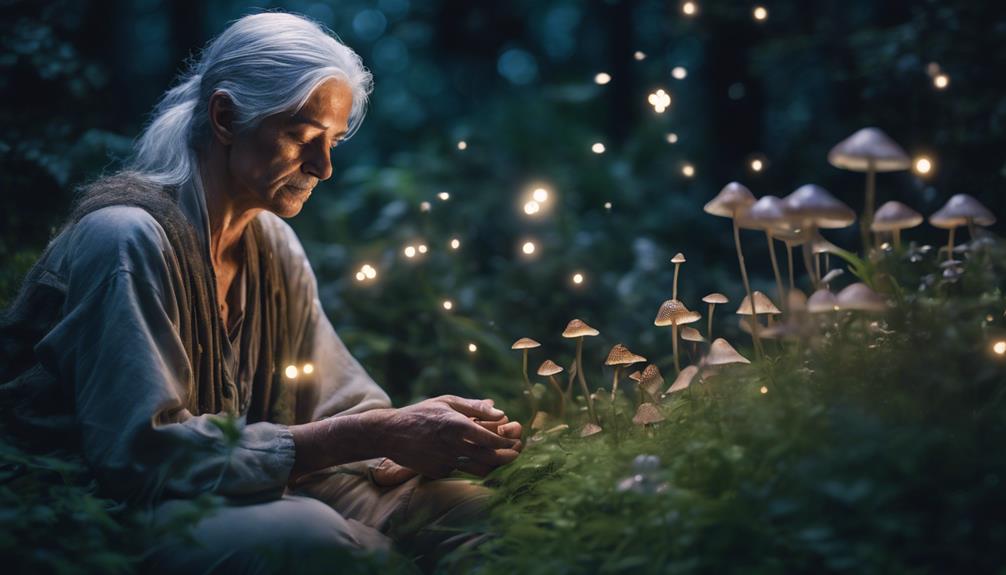
By embracing the principles of sustainable harvesting, honoring plant spirits, and respecting cultural traditions, we guarantee that our magical herbalism practices not only foster a deeper connection with nature but also promote the well-being of the plant kingdom.
This beautifully illustrated approach to magical herbalism assures that we prioritize the health and longevity of the plants we work with.
To achieve this, we must:
- Practice sustainable harvesting methods to protect plant populations
- Honor the spirits of the plants when gathering herbs for magical purposes
- Respect cultural traditions when using specific herbs in magical rituals
- Understand the potential toxicity of certain herbs to ensure safe and responsible use.
Frequently Asked Questions
Can You Be a Self-Taught Herbalist?
We can definitely become self-taught herbalists, and it's more accessible than ever. Through diligent study of botany, plant identification, and herbal safety, we can build a strong foundation.
Supplementing our learning with online resources, courses, and workshops helps fill knowledge gaps. By experimenting with growing, harvesting, and using herbs, we gain practical experience.
Joining herbalism communities and forums provides valuable insights and support. With dedication and persistence, we can develop the skills and expertise to become proficient self-taught herbalists.
How Long Does It Take to Become a Herbalist?
We typically find that becoming a certified herbalist takes time and dedication. Formal education programs can range from a few months to a few years, with certification often requiring 200-500 hours of study.
Self-study, on the other hand, can take several months to grasp the foundational knowledge and skills.
Apprenticeships or mentorship programs can also last from a few months to a couple of years.
What Is the Difference Between a Herbalist and a Herbologist?
As we explore the world of herbalism, we often come across two terms that seem interchangeable: herbalist and herbologist. However, there's a distinct difference between the two.
While both work with herbs, a herbalist focuses on the medicinal and therapeutic uses of plants, taking a holistic approach that considers spiritual and metaphysical aspects.
On the other hand, a herbologist is more concerned with the scientific aspects, studying classification, cultivation, and properties of plants, often specializing in fields like ethnobotany or pharmacognosy.
What Is a Master Herbalist?
As we explore the world of herbalism, we're often asked: what's a Master Herbalist?
Simply put, a Master Herbalist is an expert who's completed extensive education and training in herbal medicine and healing. They possess in-depth knowledge of herb properties, uses, and preparations for medicinal and magical purposes.
With certifications or degrees from reputable schools, they specialize in areas like clinical herbalism or traditional folk herbalism, promoting natural healing and wellness.
Conclusion
As we conclude our journey into magical herbalism, we're reminded that approximately 80% of the world's population still relies on traditional herbal remedies for healthcare. This staggering statistic highlights the significance of respecting the plant kingdom and harnessing the power of herbs responsibly.
By embracing the wisdom of magical herbalism, we can tap into the natural world's potent energy, fostering personal growth, balance, and transformation.
As we move forward, let's cultivate a deeper appreciation for the ancient art of magical herbalism, honoring the intricate web of life that sustains us.

